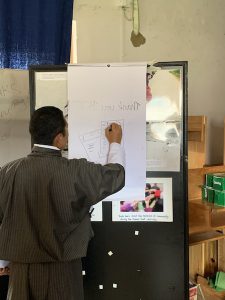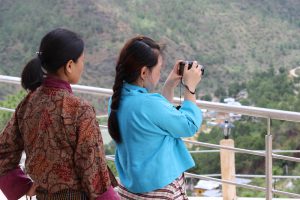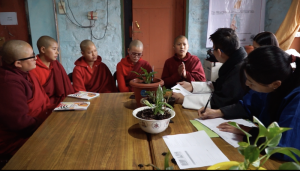June eNews
Democracy Literacy Training for Teachers
Double trouble hit the world in 2020 with the coronavirus scare and infodemic surrounding the pandemic.
With physical distancing and other measures put in place, Bhutan Centre for Media and Democracy (BCMD) conducted the News and Media Literacy and Being a Good Citizen training for 17 teachers from Drukgyel Central School and Shaba Higher Secondary School.
The discussions during the training gave participants the opportunity to discuss what it means to be apolitical, the need to know the difference between news and information and journalistic values in a democracy. Limited democracy literacy and citizenship education were among the many reasons thecitizens disengaged from the democratic process.

A participant shares his thoughts at the training on Being Good Citizen.
“As a counsellor, I have an increasing number of students availing counselling services, with issues related to social media like cyberbullying, poor time management, fake news, low self-esteem, not being mindful of their social media post and comments resulting in bigger issues. I am sure that this might be the issue that most of the other counsellors might be handling. Therefore, this training on media and democracy will enable us to understand our students better and provide all the necessary information and skills,” said Tshering Choki.
One of the participants never voted as she was overwhelmed with politics in our neighbouring countries and having to be apolitical as a civil servant. However, attending the training made her realise that change is possible. “Having attended this training, my values of good citizens are unfolding only now,” said Sonam Zangmo. Project Mi-Khung is supported by Bhutan Foundation.
Research on Citizen Participation at Local Level
As a part of Project Mi-Khung, research, an inquiry into citizen participation and democratic culture at the local level, was conducted.
A total of 55 class IX students and 21 teachers from the two project schools (Drukgyel Central School and Shaba Higher Secondary School) who participated in the project were involved. Other project participants, namely, Paro Town Committee members, community members and local leaders were also engaged in the research.
Findings from the study revealed that students’ active participation is confined to a few informal and ad-hoc school activities and that adult citizens still hesitate to give constructive feedback. In the community, residents reported a lack of adequate knowledge and understanding of democracy. At the same time, the need for establishing clarity on the line of duties between civil servants manning bureaucracy and elected local leaders were also observed.
Building on this initial success, BCMD plans to develop new programmes to further enhance meaningful citizen participation in community development. The research is funded by the Bhutan Foundation.
A Helping Hand to a Fellow CSO
The training enables the HAB as an organisation to strengthen its marketing and networking online.
In an increasingly digitising world, the half-day training on basic photography and social media guidelines will empower cottage industry members to take good photographs of their textile-based handicraft products and market it on social media following good online practices.

The training enables the HAB as an organisation to strengthen its marketing and networking online.
Bhutan Centre for Media and Democracy was glad to have collaborated with the Handicraft Association of Bhutan (HAB) to complement their training on advanced textile-based handicraft designing and product development with our strength in media. The training took place on 13 June at Punakha.
“I never imagined that photography can be so interesting to learn. I always assumed that it would be really boring and technical with a lot of memorizations of the camera parts and all. I am now aware of some techniques and tools that I can use even while taking photos with my phone to make the picture good and meaningful,” said one of the participants.
Reusable Facemask Instructional Video
The film will help educate people on the safe reuse of the cloth masks.
In response to the pandemic, CSOs came together to pool their collective resources, strengths and expertise to make face masks to meet the shortage within the country.
For this, BCMD not only contributed to the project but was also called upon to produce an instructional video outlining the use and care of the reusable fabric facemask.
While enough resources have been produced by various stakeholders on the medical masks, handwashing, distancing, etc. but none so far on reusable cloth masks. The instructional video will outline the do’s and the don’ts as well as how to take care of the mask.
Youth Voice in Youth Matters

The research captures youth engagement model with youth taking the lead.
The research captures youth engagement model with youth taking the lead.
The report provides a comprehensive analysis of aspirations of youth in relation to existing realities for which data were collected through an online survey and focus group discussions (FGD). Besides, it also captures the findings from the nine-day residential camp the members of Youth Initiative underwent in January 2020, to review the National Youth Policy (NYP) of 2011.
An analysis of some more than 1,200 youth perspectives, the research captures the youth engagement model in which youth takes the lead in different stages of consultation to review the NYP. “We are actually asked to facilitate the FGD for the collection of data among the various kinds of youth…that are there in our country. So, the mock FGD, as well as the training and all, definitely helped me to be able to prepare myself and be able to do it in real life rather than just knowing how to do it,” said Kinley Dolma Dorji.
The study showed that of the 1090 youths, only 37.24 per cent were aware of the NYP. Supported by UNICEF, the report will be published in mid-July.
